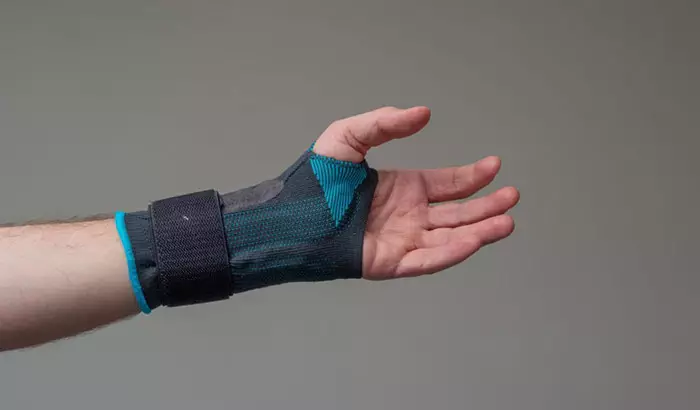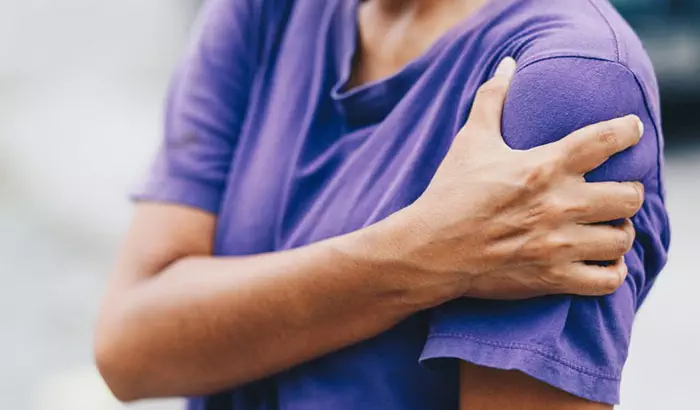Last updated on September 21st, 2023 at 01:55 am
Last updated by Maredith Damasco
Disc golf is an excellent sport that brings substantial benefits to our bodies. Playing this sport is another form of exercise or workout that will let your body move and make you fit. However, just like any other sport, playing disc golf can also lead you to sustain disc golf injuries.
In this article, we will detail common disc golf injuries that a player can sustain while playing the sport. Included is information related to the injury and the preventive steps and remedies that can be done after sustaining the injuries. Of course I am not a medical doctor and this does not replace the advice of a trained medical professional.
Shoulder Injury
Where the shoulder is used a lot, shoulder injuries are probably one of the most common injuries in this sport. If you have limited thoracic mobility, it limits the ability of the shoulder to move which makes the shoulder prone to injury.
The shoulder injury usually happens in three areas of the shoulder. One is the rotator cuff, which are muscles and tendons that surround the shoulder joint. Another is the subacromial bursae which cushion the rotator cuff. And the labrum, which is a tissue attached to the rim of the shoulder socket.
The rotator cuff plays an essential role in stabilizing the glenohumeral joint. If it fails, the players can feel significant pain and stiffness. Injuries can also happen in the shoulder if you do not have a stable base.
If your core muscles are not stabilizing the spine, it is normal for the force to spread on the other parts, especially the shoulder. The more load the shoulder takes, the more chance it will get an injury.
To prevent this injury, you need to find some exercise that will help stabilize the shoulder while also strengthening the shoulder blade area.
Back Pain
Another common injury in disc golf is back pain, which is usually caused by weak hamstrings, hips, or gluts. This exerts a constant pull towards your lower back. This situation usually happens if you have poor fitness, resulting in back pain when playing disc golf.
Another reason for back pain is poor form. Over-rotating your shoulder while underutilizing your hips can exert more torque on your lower spine and support lower back muscles, this is what causes the pain.
Going to the doctor is an excellent idea to prevent this situation from happening. But, the most practical solution is to improve your fitness by enhancing your strength and flexibility. You can also stay strong in your core during all of your shots within the round, while avoiding arching your back when making putts.
Elbow Pain

The elbow is also a common source of pain among disc golfers. This type of pain usually happens to disc golfers who use their sidearms when throwing the disc. The source of pain from the elbow usually comes from the tendons, which are tissues that attach the muscle to our bones.
When a player overuses their tendons, it can lead to a painful condition known as tendonitis. Players experiencing tendonitis typically feel pain in the elbow. Tendonitis results from weakened, low-quality, less elastic, or torn tissue, causing pain for the disc golfer.
The easiest and probably the cheapest thing to address elbow pain is to have a short break from playing actively. Apart from short breaks, minimizing or slowing down all the activities related to the sport to allow the tendons to heal.
Another solution is to have therapy. The therapy will help increase the elasticity of the tissue and increase the stability and strength of the affected joint in the elbow. It will also help increase the stability and strength of the tissue surrounding the elbow.
Knee Pain
Pain in the knee is another typical injury that a disc golfer can have in playing disc golf. Knee pain injuries in disc golf may happen suddenly or may develop over time. Those knee injuries that are acute and may happen immediately are sprains, ligament tears, meniscus injuries, fractures, or muscle strains.
These types of injuries are usually caused by bad movement patterns. For example, putting your lead foot too hard while not pivoting after the throw can cause rotational stresses to the knee, resulting in the injuries above.
The knee pain that develops over time is usually caused by overuse of the knee. Knee pain results from bad stress coming from poor form or poor fitness. The knee pain injuries that a disc golfer can experience over time are meniscus tears and patellar tendonitis.
There are a few things that you can do to prevent knee pain when playing disc golf. You should learn how to develop strength in your hips and glutes. You should also know how to control your hips when your knees are in space.
Since disc golf will walk and hike a lot while playing, make sure to keep your knees in line with the ankles and the hips when walking on stairs, inclines, and declines. Make sure that your thighs are in line and pointed in the same direction as your toes to prevent further stress on your knees.
Hip Flexor Pain
Overusage is the usual cause of hip flexor pain, especially when moving with poor form on the disc golf course. If a disc golfer uses his quad and front muscles in climbing or getting down hilly courses, it may result in this injury.
The problem with this movement is that you are not properly using the muscles the way they should be used. You should use the muscles in your buttocks when climbing steep hills or getting down.
To minimize hip flexor pain, you need to focus on using the muscles correctly, particularly the gluteus maximus muscles. An exercise to strengthen these muscles is an excellent option to resolve this issue.
Accidental Injuries
Accidental injuries may happen in the disc golf course for a number of reasons. But the best way to prevent it is to be careful all the time when you are on the disc golf course. Accidents may happen, but take safety precautions every time you are on the course.
Conclusion
There are many common disc golf injuries that may happen to a disc golfer. Whether you are a newbie, an intermediate, or an experienced player, injuries may occur for some reason. It is all about being aware of those injuries and being familiar with actions that prevent these injuries from happening to you.

